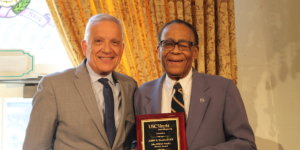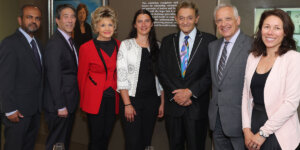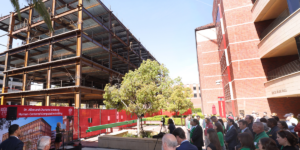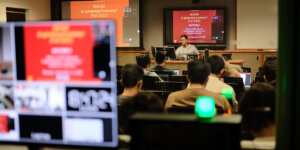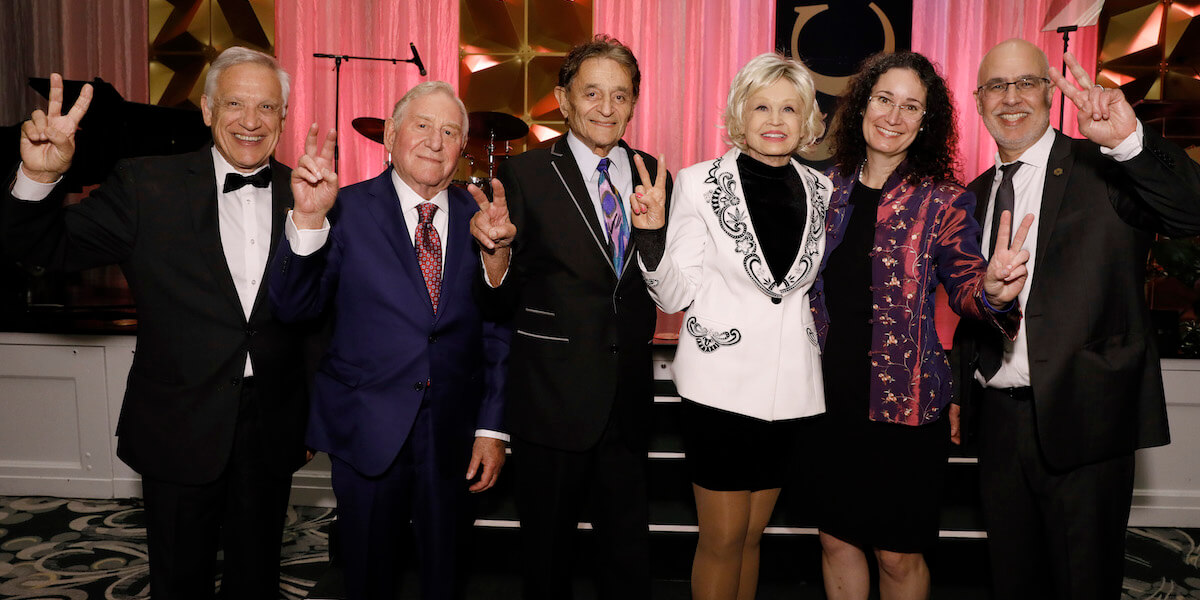
(Left to Right) USC Viterbi Dean Yannis Yortsos, Leonard Silverman, Dr. Allen Ginsburg, Charlotte Ginsburg, Sharon Walker and Scott Willoughby (Photo/Steve Cohn)
The 44th annual Viterbi Awards, “the Academy Awards of engineering,” took place on Thursday, April 13, in the beautiful ballroom of the Beverly Wilshire Hotel. Friends, faculty, alumni, students and staff of the USC Viterbi School of Engineering gathered to honor several distinguished Viterbi Award winners and to celebrate the excellence of engineering.
The Viterbi Awards recognized five honorees whose impact on engineering and society have made an important difference.
They included Leonard Silverman, dean of USC engineering from 1984 until 2001, who received the Lifetime Academic Leadership Award; alumnus Scott Willoughby, Northrop Grumman’s sector vice president of performance and operational excellence for space systems, who received the USC Viterbi Daniel J. Epstein Engineering Management Award for his and his team’s extraordinary work on the James Webb Space Telescope; Alumna Sharon Walker, B.S. Environmental Engineering ’98 and current dean of the Drexel College of Engineering, who received the USC Viterbi Mark A. Stevens Distinguished Alumni Award; and Dr. Allen and Charlotte Ginsburg, philanthropists and benefactors of the Dr. Allen and Charlotte Ginsburg Human-Centered Computation Hall.
At the event, USC Viterbi Dean Yannis C. Yortsos, also spoke on the longevity of innovation and excellence that the honorees represent by also commenting on a number of 50th, or golden anniversaries, celebrated this year at USC: the USC Information Sciences Institute (ISI), the Distance Education Network (DEN), and the USC Signal and Imaging Processing Institute, or SIPI. The dean also acknowledged the 20th anniversary of the naming of the Epstein Department of Industrial and Systems Engineering.
“The stronger and the more enduring the institution, the more such anniversaries arise,” Yortsos said. “Celebrating longevity with enduring innovativeness is, of course, the ultimate anniversary. And such innovation is at the core of our awardees tonight.”
ISI, the dean noted, revolutionized computing worldwide, playing a vital role in developing and managing the internet, originally known as the ARPANET. It launched the first operational quantum computing system in academia. And ISI researchers also built the foundation of OpenAI’s ChatGPT through their natural language processing (NLP) work.
DEN defined the concept of hybrid learning long before COVID made it a household term. Because of DEN’s infrastructure, Yortsos said, during the past academic year more than 50 Afghani women students have connected remotely over the internet to take an engineering class in the iPodia network. “This allowed them to continue their education, which was abruptly interrupted and no longer possible,” he said. “We take pride in this.”
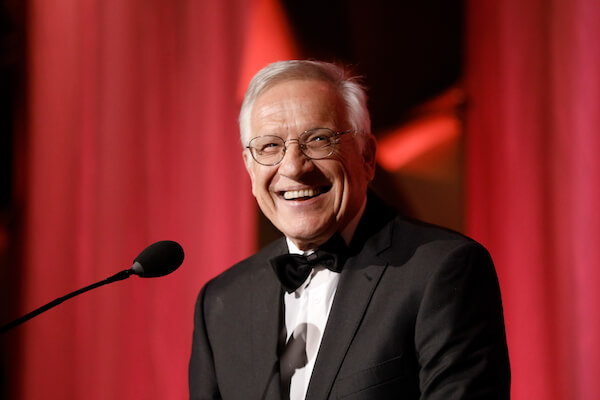
Dean Yannis Yortsos (Photo/Steve Cohn)
Yortsos announced that the Institute for Creative Technologies (ICT), “which for nearly 25 years has been the envy of the creative community for its work in AI, mixed reality, computer graphics, and virtual humans,” has officially become a part of USC Viterbi. ICT researchers pioneered special effects for movies like “Avatar” and developed an early version of the Oculus Rift.
“Together with the soon-to-be-completed Dr. Allen and Charlotte Ginsburg Human-Centered Computation Hall, it will keep positioning USC at the frontier of the technology revolution with a human-centric focus,” Yortsos said.
The 2023 Viterbi Award honorees personify excellence in all their endeavors.
Lifetime Academic Leadership Award – Leonard Silverman
Leonard Silverman joined USC in 1968 and spent his entire academic career at the university as a faculty member in ECE, as chair of the school’s electrical engineering-systems department since 1981, and later as dean.
He has always been a transformative thinker; his Ph.D. thesis at Columbia, in time-variable systems and control, had an immediate impact on the field. His prolific research career led to his early election to the National Academy of Engineering in 1988.
Silverman succeeded the legendary Zohrab Kaprielian; after Kaprielian’s untimely death in 1982, a two-year search ended in 1984, when then-Provost Neal Pings appointed Silverman as dean of engineering, a position he held until 2001.
The school blossomed under Silverman’s leadership. A new course was set to develop fields of excellence in areas such as photonics, biotechnology, multimedia, systems architecture, earthquake engineering and many others.
During his tenure, a number of important milestones were reached: The award of the first USC NSF ERC, in multimedia, which anticipated the emergence and impact of the internet; the expansion of DEN and its transition to web streaming; the founding of the Keck Photonics Lab, the first clean room on campus; the creation of a new program in SAE, which has this year culminated in the second Gordon Prize awarded to USC faculty this year; the creation of ICT; the recruitment of stellar faculty; the construction of new facilities and buildings, such as EEB and Kaprielian Hall; and the continuous cultivation of a culture of excellence.
“The period of my career spent as dean was truly meaningful to me, a time of great transition with many new directions and endeavors,” Silverman said. “I am proud that we were able to attract new support for these efforts, which all pushed USC Viterbi to the forefront of the U.S.”
The school was also greatly enhanced by newly engaged individuals on the school’s Board of Councilors, such as Daniel Epstein, Mark Stevens and Andrew Viterbi. As a result of these efforts, USC Viterbi emerged as one of the most prominent engineering schools in the nation.
Daniel J. Epstein Engineering Management Award – Scott Willoughby
Scott Willoughby is Northrop Grumman’s sector vice president of performance and operational excellence for space systems, a premier provider of space and launch systems serving national security and civil and commercial entities.
In his current role, he oversees engineering strategy and collaboration, development of program management and technical staff, and leads collaborative efforts regarding environmental and industrial compliance, sustainability and safety.
Previously, Willoughby served as vice president of operations for the Strategic Space Systems division at Northrop Grumman and vice president and program manager for the James Webb Space Telescope, the world’s largest observatory and NASA’s flagship science mission.
The James Webb Space Telescope, a remarkable marvel of technology and science, is today uncovering an extraordinary world of the universe, which teems with billions of galaxies. The telescope also gives us here on Earth a very much-needed perspective for understanding how special planet Earth is.
The telescope is expected to last for 25 years. So, in 2048, on the 70th anniversary (the platinum anniversary) of the Viterbi Awards, we will be celebrating the silver anniversary of the James Webb Space Telescope!
Willoughby received his master’s in communication systems from USC in 1991. “I’m always learning from USC,” Willoughby said. “It had a tremendous impact on me, and USC Viterbi has had an impact on the world.”
The award’s namesake, Dan Epstein, presented Willoughby with the honor.
Mark A. Stevens Distinguished Alumni Award – Sharon Walker
This year’s winner, Sharon Walker, is currently the dean of the Drexel College of Engineering and Distinguished Professor in the Department of Civil, Architectural and Environmental Engineering.
“We are proud to call her a Trojan, as she earned her bachelor’s degree in environmental engineering in 1998. So, Sharon celebrates this year her 25th USC anniversary- her silver anniversary!” Yortsos said in his introduction. “She has deep roots at USC. Her father, Jerry Walker, who is here tonight with Sharon’s mother and sister, served as USC’s Vice Provost for many decades until 2008. And sister Katie is also part of Viterbi, as she is now working at ISI.”
Walker’s academic pursuits have focused on bacterial pathogens and engineered nanomaterials. Most recently, she has applied her research to agricultural and food safety issues.
Before joining Drexel, Dean Walker held various posts at the Bourns College of Engineering at the University of California, Riverside.
She is a decorated engineer, with countless fellowships and honors to her name, including two Fulbright Fellowships and an NSF Career Award in 2010. She also heads the ELATES program at Drexel, a remarkable leadership program that mentors women faculty for university administrator roles. USC Viterbi’s Burçin Becerik-Gerber, chair of the Sonny Astani Department of Civil and Environmental Engineering, graduated from the program last year. Megan McCain, associate chair of the Alfred E. Mann Department of Biomedical Engineering, will attend it this year.
Dean Walker is deeply committed to increasing the rate of participation of women in engineering and has partnered with many deans, including USC Viterbi’s Dean Yortsos, to change the conversation about engineering.
“This achievement is a shared one. There have been trailblazers, but I see myself as a trail maintainer,” she said. “We must challenge societal and academic structures – only then can we meet the pressing challenges that face our world.”
Distinguished Service Award – Allen and Charlotte Ginsburg
Dr. Allen and Charlotte Ginsburg have had a busy month. Just last week, the university celebrated the “topping off” ceremony for its Dr. Allen and Charlotte Ginsburg Human-Centered Computation Hall, the new home for computer science at USC.
President Carol L. Folt and Dean Yortsos both spoke at the event and celebrated the pair’s longstanding passion for giving back.
Opening in 2024, the 116,000 square ft.-facility will transform the campus and the field at large. It will sit as part of a trifecta of convergence, next to Michelson Hall and Irani Hall, and it will be a hub of activity for students, faculty and partners both within the university and the community.
It was a little over four years ago when Yortsos met the Ginsburgs at the celebration of the endowment of the Center for Biomedical Therapeutics, which they had just provided, at the Health Sciences Campus. The Ginsburgs asked if they could visit USC Viterbi, which was promptly arranged.
Dean Yortsos presented to Charlotte and Allen the vision of engineering as the enabling discipline of our times, such as Engineering+ and the vision to engineer a better world for all humanity.
The conversation turned to computer science. Also at that lunch was Gaurav Sukhatme, former computer science chair and the current executive vice dean of engineering.
Sukhatme had shown to the Ginsburgs what was then a parking lot in front of the Michelson Building adjacent to Irani Hall. That vacant space cried out for a new building: a new computer science building, more specifically, one that would complete a trifecta of biomedical science, computational biology and computer science, with all three buildings contributing to advancing a human-centric mission to improve the human condition.
The vision was irresistible. And that moment was the genesis and the inception of the Dr. Allen and Charlotte Ginsburg Human-Centered Computation Hall.
“Beautiful minds are exceptional. They should be nurtured early on to help humanity,” Dr. Allen Ginsburg said. “The important thing is to get them into higher institutions of learning in order to contribute to mankind.”
Added Charlotte Ginsburg: “We thank President Folt for her influence in the design of the building. And we thank Dean Yortsos for his remarkable insight. His spirit and sense of humor are greatly appreciated.”
Min Family Challenge and Maseeh Entrepreneurship Prize Competition
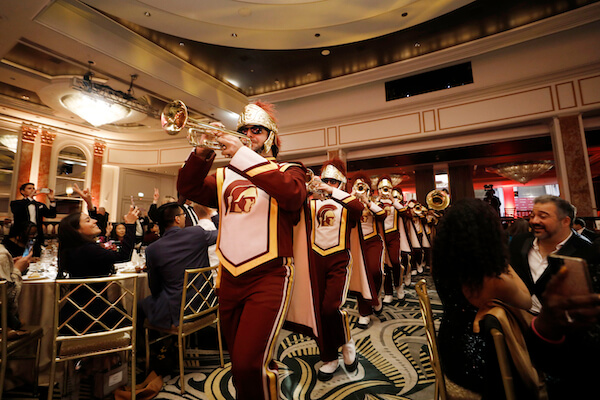
The Trojan Marching Band ended the evening on a high note (Photo/Steve Cohn)
At the Viterbi Awards, Ellis Meng, vice dean for technology innovation and entrepreneurship, spoke about USC Viterbi’s two premier business model competitions, Min Family Challenge (MFC) and the Maseeh Entrepreneurship Prize Competition (MEPC).
In 2015, Bryan and Julie Min generously endowed and launched MFC, challenging students to tackle complex engineering problems with one goal in mind: to make the world a better place.
The 2022 winning team – and winner of a $50,000 grand prize – was Remedy, a company that produces portable prescription medicine storage for the unhoused via a soft, flexible pouch that can be worn comfortably. They devised the product after extensive research interviewing healthcare providers, physicians, and end-users.
Among many issues it addresses, Remedy offers a solution to an overlooked problem when discussing transient populations: a lack of consistency in healthcare.
MEPC was founded in 2010 thanks to an endowment from entrepreneur and newly elected NAE member Fariborz Maseeh.
The annual competition aims to inspire USC Viterbi engineering innovators to develop technology-based solutions, also for some of the world’s biggest challenges. It trains and mentors teams to become successful startups and develop a lifelong mindset for innovation.
Over the past decade, MEPC has launched several promising companies, including Watershield, Second Spectrum and AesculaTech. Last year’s winning team, Playbook, dove into virtual and augmented reality, which have the potential to revolutionize how we use and interact with technology for the better. The Playbook student team built an intuitive, code-free design tool that makes programming for AR and VR experiences less challenging. As the winning team, Playbook also took home a grand prize of $50,000, money they plan to allocate toward developing a prototype and hiring employees.
“More than ever, USC Viterbi is a dynamic center of innovation and entrepreneurship,” Meng said. “Through our training programs and resources, our students have countless opportunities to realize real-world impact by developing and refining unique, new business models for their technology-based solutions.”
Published on April 14th, 2023
Last updated on April 17th, 2023




